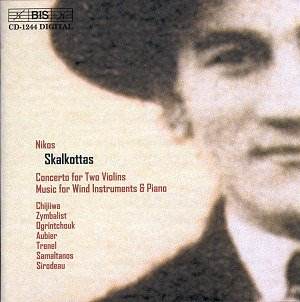In
1982, if you will forgive the memory lane for a moment, I was
in Greece. Wherever I went I tried to find LPs of music by the
man I thought was Greece's greatest composer, Nikos Skalkottas.
Most music shops and record proprietors either hadn't heard of
him or knew nothing about him; I came home empty-handed.
About
1989, quite out of the blue, BBC Radio 3 under the guiding hand
of producer John Thorney spent a small fortune on recording and
broadcasting many of Skalkottas's major compositions. Some of
these piece have been appearing on Bis's on-going series devoted
to the composer's music. This seems to run, with this recording,
to ten volumes with, it seems, much more to come.
In
1994 Philips (442 795-2) produced an almost fifty minute CD of
the composer's 'Cycle-Concert' for wind, as recorded here with
some stunning musicians like Heinz Holliger and Håkan Hardenberger.
I don't suppose it sold many copies and was fairly quickly deleted
but I shall refer to it a little.
I
realize even more than I did in the 1980s that Skalkottas is no
forgotten second-rater (a curious cross between Schoenberg - his
teacher- and a Greek folk song collector) but a prolific genius
whose music grows in stature the more you get to know it. I feel
that I could write reams about him, but, you will be glad to hear,
I will restrict myself to this new release.
The
disc appears to be the brain-child of the Greek pianist Christophe
Sirodeau who plays throughout and who wrote the extensive booklet
notes. The series has been marked by some outstanding if arguably,
overly detailed booklet notes.
It
begins with the thirty-five minute 'Concerto for two Violins',
which was never orchestrated, sadly, by Skalkottas, but is played
in the version for two pianos and two violins. It is a scintillating
three movement composition with a terrifically virtuosic ten minute
rondo finale. I ended up breathless and full of admiration for
the composer and especially the performers for whom this music
cannot have been familiar. It doesn't take long to get into Skalkottas's
language. Twelve tone yes but melodic and full of Greek dance
rhythms as the first movement demonstrates. A unique blend.
The
five pieces which make up the so-called 'Cycle-Concert' are for
wind only. I have to say that I prefer the Philips order with
the two very short 'Quartets for Piano and Winds' topping and
tailing the cycle. Bis, for some reason, end with the largest
piece in the group - the rather gloomy Bassoon Concertante. The
melancholy nature of this piece is not in my view helped by Marc
Trenel's somewhat withdrawn and muted tone. Klaus Thunemann on
Philips is much more 'up-front'. However by taking more than eleven
minutes over the middle movement as opposed to Trenel's eight,
he drags the music along and totally loses momentum in what is
after all marked Andantino.
I
realize that the modern CD player can programme pieces in any
order so my criticism is mostly irrelevant but to end with the
twelve tone 'Tango and Fox-trot Quartet (No2) makes much more
fun.
Generally
speaking the tempi on the Bis recording are faster than on the
Philips. I can only say that if they had not been the music would
not have fitted onto one CD. Seventy-nine minutes and a bit is
about as generous as a disc can be. These livelier tempi are generally
right except with the 'Oboe Concertino' where for once Heinz Holliger
is not relaxed enough and fails to enjoy the beauty of the line.
On the new disc Alexei Ogrintochouk revels in the melody and draws
from it more than I realized was there. Quite moving.
The
'Trumpet Concertino' goes at quite a lick in the hands of Aubier
who knocks one minute off Hardenberger without any loss of detail.
The
Bis recording is warmer and welcomes the listener into its ambience.
The Philips is perfectly reasonable but fails to balance the winds
against the piano quite as convincingly in the two quartets.
To
listen to Skalkottas is a unique experience perhaps a little hairshirt
at times but like a glass of Retsina there is nothing else quite
as memorable or as addictive.
Gary
Higginson
